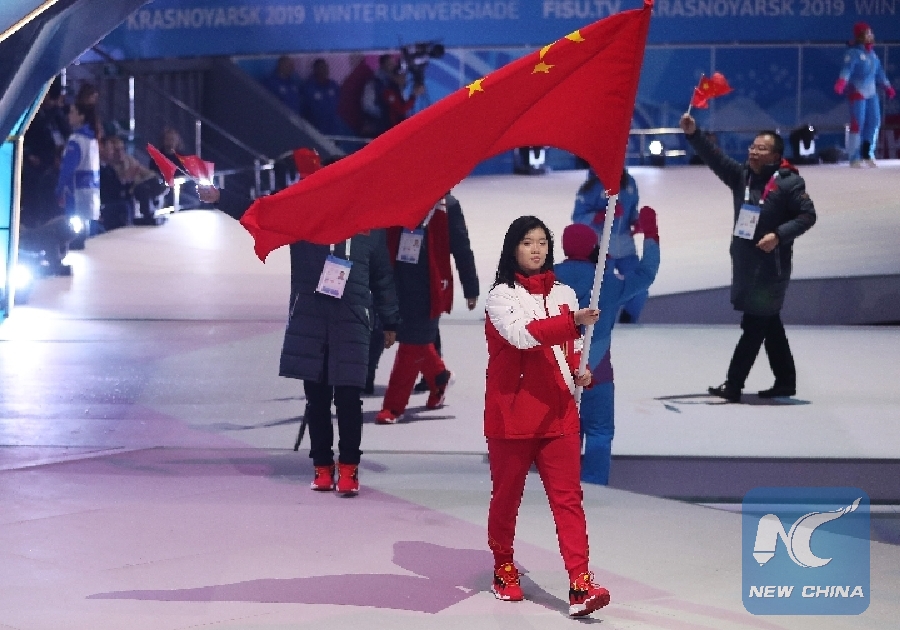
Peking University student and snowboarder Yang Shiqi bears flag for China at the Winter Universiade opening ceremony at Krasnoyarsk, Russia on March 3, 2019. (Xinhua)
By sportswriter Lin Deren
KRASNOYARSK, March 13 (Xinhua) -- The Chinese delegation, comprised of more than 80 athletes, has just concluded their 2019 Winter Universiade journey with four medals.
It's not the best performance for a country which is going to host the Winter Olympics in three years, but the Chinese participants have harvested much more than just medals.
For Peking University junior student Yang Shiqi, the Siberian city of Krasnoyarsk is a place full of beautiful memories. It's the first time for the snowboarder to take part in an international event, and also the first time to become the flag bearer for such a huge sports delegation.
Yang picked up snowboarding when she was in primary school. She grew up without professional training until she won the 2018 domestic University contest, which won her a spot in Chinese 2019 Winter Universiade team.
"I made a lot of progress during the pre-event training in Jilin, Northeast China," Yang said. "I bought some new equipment especially for the Universiade."
Yang didn't make into the final eight at the women's parallel giant slalom, but she did get her first FIS points.
Yang said she learned a lot from the world-level athletes during the competition.
"We exchanged coats and shoes with other athletes, and make some friends in the Universiade Village," she said.
Yang has decided to spend more time abroad for study. "I'm willing to learn more about the world," she said.
Yang's teammate Gao Zhiqian enjoyed his Russian trip in a different way. The former Beijing Union University student decided to choose snowboarding as his career. Gao is currently in charge of branding and marketing for an online skiing service platform.
Gao filmed his own competition with the GoPro on his helmet. After that, he was invited by China Central Television, China's state TV broadcaster, to be a commentator for a snowboarding competition. He also holds a snowboarding referee license which enables him to have more chances to be part of snowboarding competitions.
"We have tens of millions of university students in China, but only a small number of them choose to snowboard," Gao said. "But that also means we have plenty of room for improvement."
For four-time Winter Olympic gold medalist Wang Meng, the Universiade is also special. It's the first time for the short track speed skating legend to coach a team at a muti-sport international event.
"It's definitely worth coming to," said Wang. "Everybody on the team has improved, including myself."
Wang is leading quite an inexperienced team, with most of the members coming from other sports such as roller skating.
"They have already shown the potential in long-distance competitions, and the most urgent task for the coaching team is to help them improve physically," Wang said.
In the eyes of 70-year-old Chinese spectator Qi Min, the Winter Universiade is a way to get closer to her home country. She came to cheer for the Chinese women's ice hockey team.
Qi is now a resident of Krasnoyarsk. She came to Russia more than 20 years ago.
"There aren't so many Chinese in the city, so it's great to see the girls on court," she said.
The Chinese coach was impressed by the cheers from the Chinese fans.
"We are quite moved," she said. "In every corner of the world, we can feel the support from the people there, and that's something to be proud of."
"Sport is an important way of education, which can improve the leadership and teamwork of the students," said Zhong Bingshu, president of the Beijing Sports Institute.
"We did not come here only for medals. We are planning to popularize winter sports in China through the Universiade and to get prepared for the 2022 Winter Games," Zhong added.

